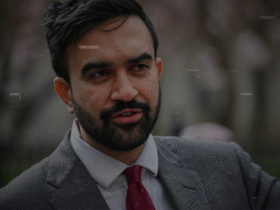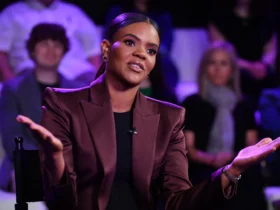Charlie Kirk support for Israel became a defining aspect of his public persona before his recent assassination in Utah. The conservative influencer and evangelical Christian frequently defended Israel during its war with Hamas following the October 7, 2023, attack. As the founder of Turning Point USA, Kirk maintained close ties with pro-Israel groups and regularly hosted pro-Israel speakers at his organization’s conferences.
Despite positioning himself as a staunch defender of Israel and the Jewish people—even claiming that “no non-Jewish person my age has a longer or clearer record of support for Israel”—Kirk’s legacy reveals certain contradictions. While he traveled to Israel and praised Trump’s policies regarding the Jewish state, including the 2018 US embassy move to Jerusalem, some critics accused him of employing antisemitic tropes, from claims of Jewish “control” over cultural life to blaming “Jewish donors” for fueling social and political ills. His assassination has now intensified concerns about the rising tide of political violence in the United States across all parts of the ideological spectrum, with radical Islamists and their leftist allies responding to his death in ways that mirror their justification of violence against Jews on October 7.
Charlie Kirk support for Israel
At just 18 years old, Charlie Kirk emerged on the conservative political scene by founding Turning Point USA (TPUSA) in 2012. Initially operating from his parents’ garage in Illinois, Kirk rapidly built the organization into an influential conservative youth movement that would eventually claim chapters at over 1,000 college campuses across America. His rise coincided with the development of his public persona as a staunch defender of Israel.
Founding of Turning Point USA
Kirk established TPUSA with a mission to identify, educate, and organize students to promote conservative principles. The organization gained substantial financial backing from wealthy conservative donors, enabling Kirk to expand his platform through speaking engagements, social media, and campus events. Throughout TPUSA’s growth, Kirk consistently positioned the organization as pro-Israel, making support for the Jewish state a cornerstone of its political identity.
Evangelical Christian roots and Zionist alignment
Kirk’s evangelical Christian upbringing profoundly shaped his worldview and political positions. His religious background fostered a theological connection to Israel based on biblical interpretations common among American evangelicals. This religious foundation naturally aligned with political Zionism, as Kirk frequently framed Israel as America’s most crucial ally in the Middle East and the only democracy in the region.
Moreover, Kirk often described the US-Israel relationship through a lens of shared “Judeo-Christian values,” a framework that resonated with his conservative Christian audience. His rhetoric consistently emphasized this religious dimension, portraying support for Israel as both a geopolitical necessity and a moral imperative for Christians.
Early visits to Israel and public endorsements
Kirk’s commitment to Israel extended beyond rhetoric. He made several high-profile visits to Israel early in his career, using these trips to strengthen his credentials as a pro-Israel advocate. Subsequently, Kirk leveraged his growing platform to endorse Israeli policies and leaders.
Additionally, Kirk forged relationships with pro-Israel organizations in the United States, regularly featuring Israeli speakers at TPUSA events. Throughout the Trump administration, Kirk enthusiastically supported policies favorable to Israel, cementing his reputation as one of the most outspoken non-Jewish advocates for the Jewish state in conservative circles.
Zionist notions and framing of the Gaza conflict
Throughout his career, Kirk consistently framed Israel through a “Judeo-Christian” lens, positioning the country as a natural ally sharing fundamental values with America. This framework became central to his advocacy for Israeli policies and military actions.
Kirk’s view of Israel as a Judeo-Christian ally
Kirk repeatedly emphasized the religious and cultural bonds between the United States and Israel. “Charlie represented the Judeo-Christian values that unite Israel and America,” noted Israeli Foreign Minister Gideon Sa’ar. As an evangelical Christian, Kirk viewed his support for Israel not merely as political but rooted in shared civilizational values, often describing himself as “a fearless warrior for truth and freedom”.
Support for the embassy move to Jerusalem
In 2018, Kirk traveled to Israel for the ribbon-cutting ceremony of the US embassy in Jerusalem. He later described this visit as “eye-opening”. According to his own accounts, Israel “changed my life” and “made the Bible pop into reality”. His enthusiastic backing of the embassy relocation aligned with his broader support for Trump’s Middle East policies.
Defense of Israeli military actions in Gaza
After October 7, 2023, Kirk became one of Israel’s most vocal defenders regarding its military campaign in Gaza. He frequently denied accusations of Israel causing starvation among Palestinians, calling such claims “pure visual warfare”. Nevertheless, Kirk occasionally expressed nuanced positions, once opposing US participation in potential Israeli strikes on Iran’s nuclear facilities.
Criticism of pro-Palestinian campus protests
Kirk strongly condemned pro-Palestinian campus demonstrations in 2024. He actively supported Republican crackdowns on these protests, particularly advocating for the deportation of Columbia University student Mahmoud Khalil. Yet Kirk balanced this stance with free speech concerns, opposing legislation that would penalize boycotting Israel.
Controversies around antisemitism and contradictions
Despite his vocal support for Israel, Kirk made statements that many considered antisemitic. These contradictions complicated his relationship with Jewish communities.
Accusations of Jewish control in media and education
Kirk claimed that Jewish donors controlled “not just the colleges; it’s the nonprofits, it’s the movies, it’s Hollywood, it’s all of it”. In October 2023, after Hamas attacked Israel, he alleged Jews dominated universities and cultural institutions, echoing longstanding conspiracy theories about Jewish institutional control.
Statements on Jewish donors and anti-white politics
In November 2023, Kirk stated, “Jews have been some of the largest funders of cultural Marxist ideas and supporters of those ideas over the last 30 or 40 years”. Furthermore, he claimed “Jewish dollars” were funding “radical open-border, neoliberal, quasi-Marxist policies”. He asserted that “the philosophical foundation of anti-whiteness has been largely financed by Jewish donors”.
Defense of Elon Musk’s controversial remarks
When Elon Musk endorsed a post referencing the antisemitic “Great Replacement” theory, Kirk defended him, saying: “Some of the largest financiers of left-wing anti-white causes have been Jewish Americans”. He argued Jewish communities were “pushing the exact kind of hatred against whites that they claim to want people to stop using against them”.
Pushback from Jewish conservatives and organizations
The Anti-Defamation League accused Kirk of creating a “vast platform for extremists and far-right conspiracy theorists”. Conservative commentator Erick Erickson called Turning Point USA “an anti-Semitic grifting operation”. Simultaneously, other Jewish figures defended him as “a true friend of the Jewish community”.
Reactions to Kirk’s assassination and political implications
The news of Charlie Kirk’s assassination sparked varied responses across political and ideological spectrums, revealing the deep divisions regarding his pro-Israel stance.
Tributes from Israeli leaders and Jewish groups
Israeli Foreign Minister Gideon Sa’ar expressed profound shock, stating, “Charlie represented the Judeo-Christian values that unite Israel and America.” Notably, Prime Minister Benjamin Netanyahu called Kirk “a fearless warrior for truth and freedom” who stood firmly with Israel during its darkest hours after October 7.
Islamist and leftist responses on social media
In stark contrast, certain pro-Palestinian activists celebrated Kirk’s death online. Some radical Islamists justified the violence against Kirk using language reminiscent of their defense of Hamas’ actions on October 7. Simultaneously, certain leftist accounts called Kirk’s pro-Israel advocacy “genocidal” and claimed he received “justice.”
Concerns about rising political violence in the U.S.
Kirk’s assassination intensified worries about escalating political violence in America. Political analysts noted this killing represented yet another alarming instance of politically motivated violence affecting both sides of the ideological spectrum. Several commentators highlighted how this event might further polarize an already divided nation.
Trump and GOP figures’ statements
Former President Donald Trump described Kirk as “a tremendous patriot” and vowed to continue his legacy of supporting Israel. Likewise, prominent Republican leaders emphasized Kirk’s unwavering commitment to Israel, framing his assassination as an attack on American values and the U.S.-Israel alliance.
Curious about where other U.S. representatives stand on the Israel-Palestine conflict? Explore more profiles here.
Final Thoughts
Kirk’s legacy regarding Israel represents a complex intersection of evangelical Christianity, conservative politics, and Middle Eastern geopolitics. His steadfast support for Israel became a defining element of his public image, yet his statements about Jewish influence in American institutions created significant tensions within the conservative movement.
The contradictions between Kirk’s pro-Israel advocacy and his controversial remarks about Jewish donors highlight a broader tension within certain segments of American conservatism. Many figures on the right simultaneously express strong support for Israel while occasionally employing rhetoric that Jewish organizations consider problematic.
Kirk’s assassination has consequently intensified discussions about the relationship between evangelical Christianity and Zionism in American politics. His death also underscores the increasing politicization of the Israeli-Palestinian conflict within domestic American discourse, where positions on Gaza often serve as ideological markers.
The polarized reactions to Kirk’s death mirror the divisions regarding the ongoing Gaza conflict itself. Ultimately, Kirk’s complicated legacy reflects the challenges of navigating Middle Eastern politics within the American political landscape, where support for Israel has traditionally transcended partisan lines but has become increasingly contentious in recent years.
FAQs
1. Why was Charlie Kirk known for his support of Israel?
Charlie Kirk made Israel a central part of his political identity. As the founder of Turning Point USA, he consistently defended Israel in speeches, social media posts, and conferences. He frequently visited Israel, praised Trump’s pro-Israel policies, and described the U.S.-Israel relationship as rooted in shared “Judeo-Christian values.”
2. What role did Kirk’s evangelical Christian background play in his support for Israel?
Kirk’s evangelical upbringing shaped his worldview, as many evangelicals believe in a biblical obligation to support Israel. He framed support for Israel not just as a political strategy but as a moral and religious duty, aligning his theology with political Zionism.
3. What contradictions existed in Kirk’s pro-Israel stance?
Despite being a vocal pro-Israel advocate, Kirk sometimes used rhetoric seen as antisemitic. He claimed Jewish donors and institutions controlled cultural life, universities, and even anti-white politics — remarks criticized as echoing old antisemitic tropes. These contradictions created tensions between his public support for Israel and his criticism of Jewish influence.
4. How did Kirk respond to the Gaza conflict after October 7, 2023?
Kirk became one of Israel’s most outspoken defenders, supporting its military campaign in Gaza and denying accusations of Palestinian starvation. However, he occasionally showed nuance, opposing direct U.S. involvement in strikes on Iran while still strongly backing Israel’s right to defend itself.
5. What criticisms did Kirk face from Jewish organizations and conservatives?
Groups like the Anti-Defamation League accused him of amplifying extremists and conspiracy theories. Conservative commentator Erick Erickson even labeled Turning Point USA an “anti-Semitic grifting operation.” Still, some Jewish leaders defended him as a true ally of the Jewish people.
6. How did people react to Charlie Kirk’s assassination?
Reactions were polarized. Israeli leaders, including Benjamin Netanyahu, praised him as a fearless defender of Israel. In contrast, some radical Islamists and leftist activists celebrated his death online, framing it as “justice” for his pro-Israel advocacy. His killing has sparked wider concerns about rising political violence in the United States.
7. What impact might Kirk’s assassination have on U.S. politics?
His death has intensified debates about political violence, U.S.-Israel relations, and evangelical Christian support for Zionism. Analysts warn that it could deepen polarization, as Republicans frame the killing as an attack on American values while critics highlight his controversial rhetoric.
8. What is Kirk’s legacy regarding Israel and U.S. conservatism?
Kirk’s legacy is a mix of steadfast pro-Israel advocacy and controversial statements about Jewish donors and cultural influence. He exemplified the evangelical-conservative alliance with Israel but also exposed the contradictions within the American right, where support for Israel often coexists with rhetoric criticized as antisemitic.







Leave a Reply